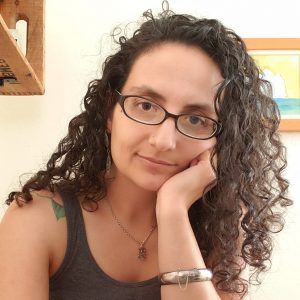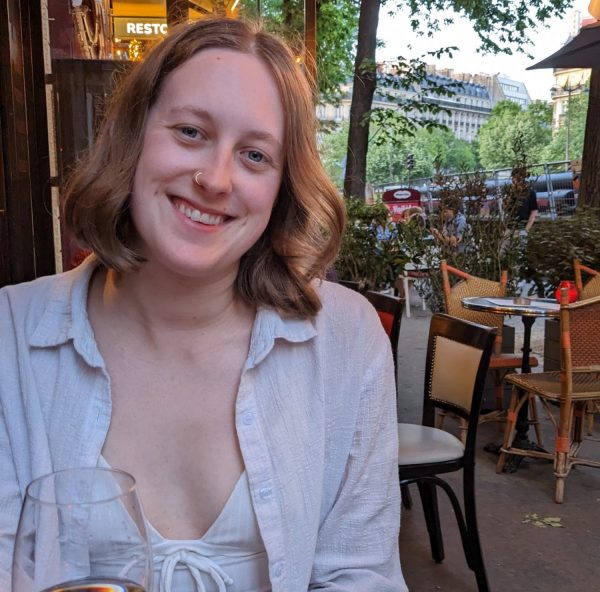 Analía Villagra talks eccentric female protagonists, crowded apartment buildings, and the power of punctuation in fiction with editorial assistant Maia Coen.
Analía Villagra talks eccentric female protagonists, crowded apartment buildings, and the power of punctuation in fiction with editorial assistant Maia Coen.
Analía Villagra’s work appears in Colorado Review, Ecotone, Ploughshares, The Iowa Review, and elsewhere. She is a National Endowment of the Arts fellowship recipient. Her writing has also been supported by the Sewanee Writers’ Conference (where she was a Tennessee Williams Scholar), the Tin House Summer Workshop, and the Kenyon Review Writers Workshop. She is an assistant fiction editor for Split Lip Magazine.
Maia Coen: First, I’d like to hear a little about how “Need Her Badly” came to be. Because it’s inherently weird, and I am so drawn to weird female characters. Can you tell me about where the inspiration came from?
Analía Villagra: Sure, this was basically my pandemic story. I think I started working on it at the end of 2020. And, like many people, I was suddenly spending a lot of time in my apartment, wondering about all my neighbors, who were also spending a lot of time in their apartments. Yeah, that was the genesis of it, thinking about my next-door neighbor wondering what she was up to.
MC: Did you ever actually knock on the wall and talk to her like in the story?
AV: I didn’t, I didn’t. But, you know, you can hear all the water through the pipes in the bathroom. You know, those sorts of things are things you hear in apartments. And I also remember living in larger buildings, and it always sounded like the people above you were bowling. I don’t know what it is that we all do that sounds like bowling from below. But it’s just one of those things that suddenly when your life is only taking place within those walls, it seems more interesting, more important, I guess, because it’s all day.
MC: Yeah, I particularly like at the beginning of the story when the unnamed character goes over to talk to the neighbor about the noise and the neighbor says she’s banging her head against the wall. And I love how that seems to be literal. There’s no reason for us to think that’s a metaphor.
AV: And, you know, why not? Again, it’s the pandemic, we’re all locked at home. Why wouldn’t we be, literally as well as metaphorically, banging our heads against the wall?
MC: So, speaking of weird female characters, to me the main character feels almost apathetic towards everything that’s going on around her. That makes a lot of sense knowing it’s a pandemic story. What was your vision of her?
AV: I think there’s an interesting tension, that we all experience in some way, that if you say you want something, or admit you want something, if you say it out loud, suddenly there are stakes, right? So, I like the idea of watching someone who, as readers we know this woman wants things, she’s not that slick. She thinks she’s being so clever, but we see right through her. Like, if she doesn’t admit that she wants to be friends with this person then when she gets blown off its okay. It’s just that elementary school impulse to deny that you want that thing.
MC: Yeah, she’s almost an unreliable narrator. Like when she texts the guy, claiming she just wants to tell someone about the neighbor, like sure, you’re not lonely at all.
AV: Exactly, we don’t want to believe her. Her actions and her words are so far apart.
MC: I notice you said “friend,” and I was wondering if that was all they wanted their relationship to be. There are all these moments in the story that mention sex and they’re almost talking to each other through that lens. Is it just friendship she’s looking for, or does she even know?
AV: I think there’s something deeper there than casual friendship. But I don’t know how much of that is just an effect of talking to yourself, which is another thing I found interesting about being trapped at home all day long and thinking about your neighbors: you start to project a lot of ideas onto people you’ve never interacted with. They become characters in a way. And that’s what’s happening, she’s projecting herself onto a character who sometimes does and sometimes doesn’t meet those expectations. I was thinking about to what degree this neighbor is her own person, and to what degree is she just a reflection of something the narrator wants?
MC: Yeah, and how not naming either character makes that a little blurrier.
AV: Yeah, and that was one reason for not using quotation marks. I wanted there to be moments where it wasn’t super clear whether or not the thing was said out loud, or whether it was set in her head. The neighbor exists in this story because the narrator wants her to. I like quotation marks in general, but I do like the effect of not knowing who is really speaking.
MC: That’s really interesting. Punctuation can do so much in a story.
AV: Punctuation is super interesting and can be used so differently. In Spanish literature quotation marks aren’t used so there’s this sort of floaty feeling of moving in and out of the world, and the mind, of whoever is narrating the story.
MC: I was wondering if the conversation with the two characters mothers had to do with this blending you were trying to produce, or was it something else?
AV: I was interested in opportunities where both characters could be doing the same thing, or there could be parallels, without getting too hokey, and the scene where they are both on the phone with their moms was one. I just liked the idea of them doing the same thing at the same time and not really listening to one another.
MC: Yeah, hearing you talk about how they are reflections of each other really puts the story into perspective. I like stories where we aren’t entirely sure what’s going on all the time.
AV: It’s a lot of fun. There was definitely a moment where I was like, hmm, is the neighbor even really there? Thinking back on that unreliable narrator, we only know about the neighbor based on what the narrator tells us about her. We spent so much time in our heads during the pandemic and you make stuff up when you’re trapped like that, and there’s no one to tell you otherwise.
MC: Totally, my writing got a lot weirder and more fantastical during the pandemic.
AV: I think that makes a lot of sense. When the rules are starting to trickle away, I guess we have to come up with something else.
MC: I wanted to talk about drafting a little bit. What does it look like for you? Are you the type of writer that has an idea and a short story pours out of you? Or do you plot and plan?
AV: I definitely don’t plot. Part of the process for me is wandering into a world and working it out. So, for me, a story starts with a spark of an idea or an image. For this story, it was listening to someone banging on the wall. I wrote the beginning and then didn’t come back to it for six months. I like to wonder, who is this? Who is this person who’s listening to her neighbor bang her head against the wall. And as I was writing a darker version of this story these weird kind of zany, humorous moments kept popping into it and eventually it became its own story.
MC: Do you like revision, or are you one of those writers that despises it?
AV: I love revision. I deeply dislike the first draft. Having nothing freaks me out, I love having something, even if it’s a horrible disaster, and then I can start to navigate it.
MC: That’s interesting that you like revising better than writing the first draft. I think the first draft is my favorite.
AV: Oh my God, good for you! The blank page is just so terrifying to me. I think there’s also some terror in writing something you really like and then realizing these five hundred words are just not working and so they have to get cut. It’s a little brutal.
MC: Have you ever tried writing a novel?
AV: I have. I have a first draft but I’m afraid to read it. It’s sitting there, it’s ready to go. I just have to start looking at it and I’m kind of terrified. Any words of wisdom about how to even start to look at a second draft would be welcome.
MC: I definitely don’t have those. I’m currently writing a novel, and it’s going fine, but I can imagine once I finish it how daunting it will be to return to it and try to revise.
AV: There’s just so much of it. I’m staring at it right now, just sitting in a folder over there.
MC: Have you had anybody else read it yet?
AV: Oh, absolutely not. Not in a hundred years. People have read pieces, and I’ve read pieces, but I’ve never read the whole thing through. Most of it probably doesn’t make a ton of sense yet. Which is fine, as long as it makes sense to me.
MC: I feel like it’s hard sometimes to know whether your own work is good.
AV: Or to accept that it probably isn’t that good, but it will be. It’s the first draft, it isn’t supposed to be good, it’s supposed to be what you use to get to the fifth draft. Getting through the first draft is how you, the writer, figure out what you were trying to do. Once you realize it, then you make it legible for someone other than yourself. But it’s just so long, compared to a short story. I’m like wow. It’s just a lot of words.
MC: It was so nice to chat with you and hear about your process!
AV: Thank you so much for asking the questions and holding me accountable for myself, because now that I’ve said it out loud, I’m going to have to read the draft of my novel and figure out what I’m doing…This is good, this is how I nudge myself forward.
 Maia Coen is a first-year MFA candidate in fiction at CSU and an editorial assistant at the Colorado Review. She likes to write weird stories that push people to examine the darker parts of themselves but is still an eternal optimist.
Maia Coen is a first-year MFA candidate in fiction at CSU and an editorial assistant at the Colorado Review. She likes to write weird stories that push people to examine the darker parts of themselves but is still an eternal optimist.